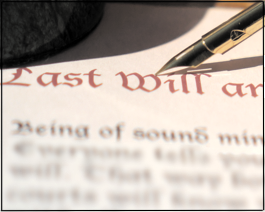 Everyone tells you that you need to have a will. That way both your relatives and the courts will know what you wanted done with all your stuff. As we get older the need for a will usually becomes fairly obvious and it’s a good wellness behavior to “get one’s affairs in order.”
Everyone tells you that you need to have a will. That way both your relatives and the courts will know what you wanted done with all your stuff. As we get older the need for a will usually becomes fairly obvious and it’s a good wellness behavior to “get one’s affairs in order.”
Wills relate to the disposition of physical assets (“stuff”). Lawyers generally advise against including personal opinions (as in “My lousy, good-for-nothing brother-in-law gets…”) and philosophical observations (as in “”My higher powers have directed me to dispose of my assets… “).
But you say “I have all this super useful wisdom to pass along? What did I do?” The answer lies an another form of a will: an Ethical Will. This is a document that you write and in it you put your wisdom and history… any and all things that you want your descendants to know. It’s not a legal document nor is it a memoir.
Beth LaMie defines it thus, “An ethical will, also called a legacy letter, is a document written to pass on important considerations, such as experiences, values, wisdom, and blessings, to loved ones. An ethical will can be shared with family members or friends either at the time it is written, or preserved to be read after the author’s death. Originated as the Jewish tradition of passing down values orally, ethical wills have been around for over 3,500 years.”
Ethical wills in Biblical times were oral stories told at one’s bed side. Later they were a paper-based document. These days your ethical will could be an online blog, a YouTube video, or perhaps the next new digital thing. A 3D hologram perhaps.
Andrew Weil writes, “I can think of no better way to end this book than to recommend that you undertake the composition of an ethical will. No matter how old you are, it can be an exercise that will take stock of your life experience and distill from it the values and wisdom that you have gained. You can then put the document aside, read it over as the years pass, and revise it from time to time as you see fit. Certainly, an ethical will can be a wonderful gift to leave to your family at the end of your life, but I think its main purpose is what it can give you in the midst of life.”
Resources
- A National Public Radio program dealing with ethical wills: http://www.npr.org/templates/story/story.php?storyId=3166037
- Examples of ethical wills can be read here: http://celebrationsoflife.net/ethicalwills
- A template for writing an ethical will can be found at http://bethlamie.com/ethical-wills.html (This web site is a commercial one but the information is freely provided).
- A web site where people write and share their life stories: http://www.storyofmylife.com
Reference
Weil, A. Healthy Aging: A Lifelong Guide to Your Physical and Spiritual Well-Being. Random House of Canada, Mississauga, ON, 2005, p. 298.
Join us for a real-time discussion about ideas raised by this essay on Wednesday from 12:00 p.m. to 12:45 p.m. See Discussion and SL tabs above for details. Link to the virtual meeting room: http://tinyurl.com/cjfx9ag.
Leave a comment